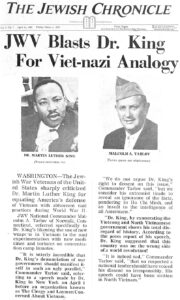JEWISH War Veterans “Blast” Dr. Martin Luther King, Jr., 1967
Jewish Chronicle, April 7, 1967
The Jewish War Veterans of the U.S.A. today sharply criticized Dr. Martin Luther King for equating America’s defense of Viet Nam with abhorrent Nazi practices during World War II.
JWV National Commander Malcolm A. Tarlov referred specifically to Dr. King’s likening the use of new weapons in Vietnam to the Nazi experimentation with new medicines and tortures on concentration camp inmates.
“It is utterly incredible that Dr. King’s denunciation of our Government should manifest itself in such an ugly parallel,” Mr. Tarlov said, referring to a speech made by Dr. King in New York on April 4 before an organization known as The Clergy and Laymen Concerned About Vietnam.
“We do not argue Dr. King’s right to dissent on this issue, but we consider his extremist tirade to reveal an ignorance of the facts, pandering to Ho Chi Minh, and an insult to the intelligence of all Americans.”
“Dr. King, by exonerating the Vietcong and North Vietnamese government shows his total disregard of history. According to the press report of his speech, Dr. King suggested that this country was on the wrong side of a world revolution!
“It is indeed sad,” Commander Tarlov said, “that so respected a national leader should have voiced his dissent so irresponsibly. His speech could have been written in North Vietnam.”
See also this 1987 statement by Dr. Alan Blum:
When the late Dr. Martin Luther King castigated the administration for stepping up the role in the Vietnam War while ignoring commitments to minorities at home, he provoked a fuselage from all sides, including many within the civil rights movement. Newsweek accused Dr. King of simplistic political judgment in which a race-conscious minority was dictating foreign policy. The Washington Post described it as the diminished usefulness of Dr. King to his cause, to his country and to his people. An editorial in The New York Times entitled “Dr. King’s Error” maintained that the cause of Negro equality had suffered a setback with the facile fusing of civil rights and foreign policy.
Whitney Young, Carl Rowan, Ralph Bunche, and Roy Wilkins all sharply criticized Dr. King for allegedly causing harm to the civil rights movement. And the NAACP Board of Directors unanimously opposed any effort to fuse the anti-war movement with the civil rights movement.

